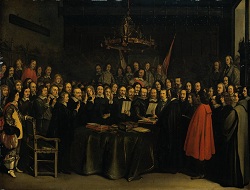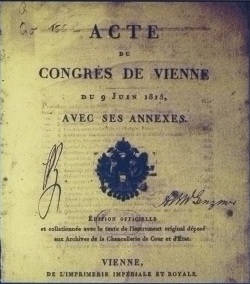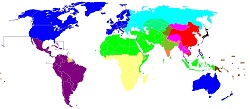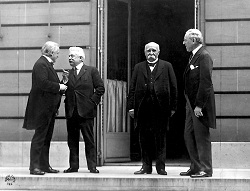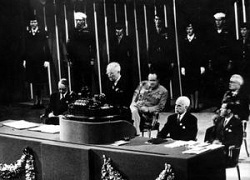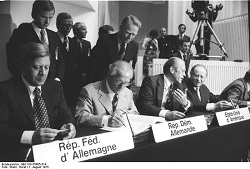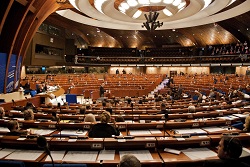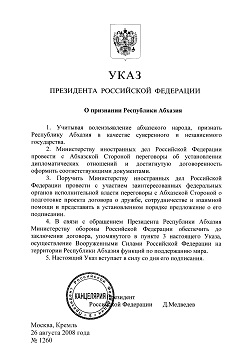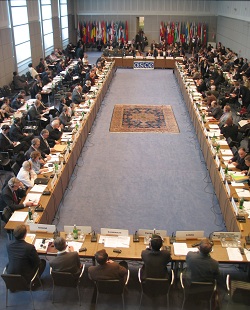History of Cultural Relations Policy
Transformation in International Relations
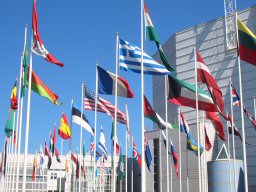 International cultural relations in the 20th century have went through changes which were influenced by the effects of the First World War (attempts for minority protection) the aftermath of the post-war political thought from 1945 (integration tendencies), the oil crises in the 1970s (greater role of transnational companies), the collapse of the bipolar system in 1991 (non-governmental groups access to armed forces) and finally by the emerging cultural policies in the last decades. Explanation of current trends in international relations requires deeper analysis for historical background of present world order.
International cultural relations in the 20th century have went through changes which were influenced by the effects of the First World War (attempts for minority protection) the aftermath of the post-war political thought from 1945 (integration tendencies), the oil crises in the 1970s (greater role of transnational companies), the collapse of the bipolar system in 1991 (non-governmental groups access to armed forces) and finally by the emerging cultural policies in the last decades. Explanation of current trends in international relations requires deeper analysis for historical background of present world order.
Relations among nations in a contemporary sense were determined by balance of power for a long period of time. This concept had shaped the interactions between great powers and relatively weak countries in the 19th century and the first decades of the 20th century. Balance of power effected stability between competing forces in international system. Political, military power and economic strength of these units were similar and no super power could be found in the system. In this case at least five states played major role. Infrequently there was a balancing state which aim was to preserve the equilibrium between other states. Due to its consciously formed foreign policy, balancing state did not make constant alliances. The United Kingdom had this role in European interstate relations until the end of Second World War.
After 1945, as a new world order was formed, the role of the balancing state was converted to a mediator organization in a loose bipolar system. This system contained two blocs of states besides numerous non-aligned countries and also several generalist interstate organizations which included all the socialist and capitalist countries. Political division of the world had both sociological and ideological aspects. United Nations and its Security Council was the main forum for mediating in the case of clashing political blocs. The other source for securing international order in this system was nuclear deterrence. By developing arms of nuclear weapons and weapons of mass destruction some states became able to protect themselves against existential threat by the single fact that they had the capability to use nuclear force. This system had its stability because of the effects of the deterrence of the state-developed nuclear weapons. Regional wars and proxy wars served often as a place for clashing interests supported by super powers.
As the collapse of the Soviet Union the relations among nation states had slightly changed. By the vanishing of the great power, the new countries on its remains became unprotected, sovereign and needed in the same time. Two aspects of transforms were visible after the end of bipolar system in 1991. Regional integrations (such as European Union, African Union, NAFTA, etc.) became more powerful. These organizations are structured either on supranational or intergovernmental decision-making institutional order, or combination of both. Nowadays these integrations act as independent international entities. The other aspect of changing trends in international relations is interdependence. Diverse sources of raw material and best utilization of labor force is specific in developing countries, while industries and high markets are situated in developed countries. This division of resources, processing and consumption enables to regard cooperating states as interdependent.
In the age of the penetration of global economic or political thinking and solutions and under the aegis of integrated states as the engine of sustainable development, globalization provided new opportunities for international actors. These opportunities related to inter connectivity and emerging role of global and transnational economic companies versus politics and more simple form of turning into independent actor in the global relations. After the oil crises of the 1970s, traditional roles of nation states have weakened. This environment enabled newly emerging powers and non-governmental groups to step on the stage of world politics. From this time we can observe a competition between governments and transnational companies to gain power and influence.
Two major indicators helped for the above mentioned entities to become more relevant participants of transforming international order: economy and armed forces.
On economic aspect most important non-governmental organizations are the international pressure groups of different interests and transnational companies besides powerful nation states. While states are forced into regional cooperative organizations and transnational companies have more power, although there are distinct newly emerging states with considerable political power as well. Such countries previously owned great amount of raw materials and labor force – without having stable governmental background. Today these states have the capacity and ready to become dominant regional powers and constitute new pillars of a world system based on multi-polarity.
On the military aspect, terrorist groups and the threat of rogue states become more apparent besides national and legal international arms. War against terror and actions against threatening states became the main source of conflicts at the same time as national boundaries are weakening and military operations become regardless of location. In this system, stability is based on the balance of money and control of transnational companies, as more groups have access to sources of weapons.
Besides military power great powers use their soft power to gain influence. In post-bipolar international relations vaporous national boundaries and interdependence facilitated international ethnic and cultural cooperation. Former colonies and new countries seek to establish closer ties with their diaspora after the dissolution of empires. In order to strengthen political bonds initiatives for new dialogue are needed. In the first decade of the 21st century kin-state policies and legal forms of pan movements contributed to changing way of thinking in foreign relations. As cultural relations policy became relevant, international community is more involved in minority protection and dialogue among cultures.
Historical events
The history of cultural relations policy is constructed by both the historical events which influenced the development of interstate relations and by the international legal instruments (historical treaties and documents) which facilitated cross-border relations of sub-national regions.
Emergence of group-identity and national identity
 In the 5th century BCE, Herodotus was the first who stated the main characteristics of ethnicity. As Samuel Huntington quotes in his book, The clash of civilizations and the remaking of world order: the key cultural elements which define a cultural group or civilization “were set forth in classic form by the Athenians when they reassured the Spartans that they would not betray them to the Persians … Blood, language, religion, way of life, were what the Greeks had in common and what distinguished them from the Persians and other non-Greeks.” These factors contributed to the process by which a group of people comes to be understood or to understand themselves as ethnically distinct from the wider social landscape from which their grouping emerges.
In the 5th century BCE, Herodotus was the first who stated the main characteristics of ethnicity. As Samuel Huntington quotes in his book, The clash of civilizations and the remaking of world order: the key cultural elements which define a cultural group or civilization “were set forth in classic form by the Athenians when they reassured the Spartans that they would not betray them to the Persians … Blood, language, religion, way of life, were what the Greeks had in common and what distinguished them from the Persians and other non-Greeks.” These factors contributed to the process by which a group of people comes to be understood or to understand themselves as ethnically distinct from the wider social landscape from which their grouping emerges.
Since the beginning of that process, distinction of a specific group results either the above mentioned ethnos or demos as well. Demos refers to people who share a common territory and government irrespective of their ethnic make-up. Hence demos in the contemporary sense is a community based on citizenship.
Treaty of Tordesillas
The Treaty of Tordesillas – signed in 1494 – was intended to settle the contentious matter of possession of newly discovered lands of the non-Christian world between Portugal and Spain. It divided the New World between the two countries by establishing a north-south line of demarcation at a distance of 370 leagues west of the Cape Verde Islands. All newly discovered territories west of this line went to Spain, and others discovered east of the line went to Portugal. The treaty and its outcome – the division of the world – significantly contributed to the cultural diversity of the two parts.
Age of Exploration
According to Samuel Huntington, before 1500 A.D., civilizations were separated geographically and the spread of ideas and technology took centuries. Research and technology have been the catalyst for civilization creation and development. By 1500 A.D., evolution in ocean navigation by Western cultures led to rapid expansion and eventual domination of ideas, values, and religion.
Westphalian system
The Peace of Westphalia (1648) that ended the Thirty Years’ War, inaugurated the modern European nation state system and emerged the era of sovereign states. Not only did the Westphalian system bring relative peace after the chaos of the century preceding it, but the treaty has become the foundation of the modern international system and relations. The Peace of Westphalia has several key principles, which explains its importance and impact on the world today. These are the principle of sovereignty of states, the principle of equality between them and the principle of non intervention of one state in the internal affairs of another state.
The emergence of nationalism
Describing the conflict of nations R.R. Palmer finds that in 1793 “the wars of kings were over; the wars of peoples had begun.” This nineteenth-century pattern lasted until the end of World War I. Development of nationalism is closely related to that of the modern state and the push for popular sovereignty that surfaced with the French Revolution and the American Revolution in the late 18th century and culminated with the ethnic/national revolutions of Europe. In the era of emerging nationalism, in addition to common language, ethnicity and religion as criterion for a nation, the consciousness of belonging or having belonged to a lasting political entity became the most decisive criterion of proto-nationalism.
Congress of Vienna
The Congress of Vienna – held from September, 1814 to June, 1815 – was an international conference aiming to restore the territorial and political status quo in Europe after the Napoleonic Era. It was the first occasion where national delegates came together instead of relying messengers. The Congress and its five founding powers (Austria, Prussia, the United Kingdom, Russia and France) formed a new international system, called „Concert of Europe”, which term assumed the framework for European international politics until the outbreak of the First World War.
German and Italian unification completed. The rise of pan-nationalism
German unification was the merging of the states in the North German Confederation and other German states to form the German Empire and Italian unification was the political and social movement that agglomerated different states of the Italian peninsula into the single state of Italy in the 19th century.
German and Italian nationalism roots in pan-movements having liberal and democratic character in 1848 shifted to pragmatic approaches of nation state formation. The process of unification began in 1815 with the Congress of Vienna and the end of Napoleonic rule, and ended in 1871 with the Franco-Prussian War. At that time pan-nationalist sought to extend hegemony throughout the German states and different states throughout the Italian peninsula. Series of wars led to military successes and helped to achieve unification.
The unification of Germany fundamentally altered the delicate “balance of powers” established by the Congress of Vienna with the creation of a large, wealthy, and powerful nation-state in central Europe. Moreover, it is a useful case study besides Italian unification for the broader concept of “nationalism” as a historical agent.
Uti possidetis and the independence movements in Latin America
Uti Possidetis is a Latin term which means ‘as you possess’. According to one explanation of this principle of international law, the parties to a treaty can retain possession of what they have acquired by force during the war. Territories and property can remain in the hands of a belligerent state after a war, unless otherwise provided by a treaty. When a war ends a treaty formed can adopt the principle of uti possidetis, or the principle of status quo ante bellum, or a combination of the two. The principle of status quo ante bellum means ‘the state of things before the war’. If a treaty consists of no condition regarding the possession of property and territory taken by force, the doctrine of uti possidetis will prevail.
More recently, the principle has been used in a modified form to establish the frontiers of newly independent states following decolonization, by ensuring that the frontiers followed the original boundaries of the old colonial territories from which they emerged.
The first practical implication of uti possidetis traces back to anti-colonial independence movements in Latin America in the 19th century. The same principle was applied to Africa and Asia following the withdrawal of European powers from those continents. In 1964 the Organisation of African Unity passed a resolution stating that the principle of stability of borders – the key principle of uti possidetis – would be applied across Africa. Dissolution of the Soviet Union and Yugoslavia also followed the principle of status quo regarding international boundaries.
Uti possidetis juris, as it stands at the present, is based on two ideas: self-determination and the non-interference in the internal affairs of other countries.
Multidirectional interactions among all culture
Twentieth century relations among civilizations have moved beyond the unidirectional influence of the west on the rest. Instead, “multidirectional interactions among all civilization” has been maintained. In other words, cultural influence became interdependent; western civilizations are influenced by smaller, less powerful civilizations around the world.
Paris Peace Conference and minority protection in the inter-war period
As a result of the Paris Peace Conference a series of Minority Treaties entered into force and became the cornerstone of the League of Nations’ system of minorities. The Minority Treaties, recognized as history’s first minority treaties, were an important step in protection of minorities and recognition of human rights, bringing the subject to an international forum. In them, for the first time, states and international communities recognized that there are people living outside normal legal protection and who required an additional guarantee of their elementary rights from an external body, as protection within individual states itself may not be sufficient. Prior the Second World War there was no claim for the universality of minority rights. The minority issue in the inter-war period was exclusively a foreign policy issue.
Montevideo convention on the Rights and Duties of States
The Convention codified the declarative theory of statehood as accepted as part of customary international law. Under the Montevideo Convention, an entity is a State when it possesses: (1) a permanent population; (2) a defined territory; (3) a government and (4) the capacity to enter into relations with other states. Article 3 of the Convention declares that statehood is independent of recognition by other states.
Charter of the United Nations
The Charter of the United Nations – signed by 50 countries, on 26 June 1945, in San Francisco – is the foundational treaty of the United Nations. This new international organization was established after World War II in order to maintain international peace and security and to achieve cooperation among nations. Its forerunner was the League of Nations, established in 1919 for the same reasons, but it proved incapable of preventing World War II. The Charter of the United Nations is a constituent treaty, all member states are bound by its articles.
A year for human rights
The massive and systematic human rights abuses committed during World War II promoted the development of human rights protection. In 1948 international organizations adopted several important conventions recognising the universality of human rights such as the American Declaration of the Rights and Duties of Man (April, 1948), the Convention on the Prevention and Punishment of the Crime of Genocide (December, 1948) and the Universal Declaration of Human Rights. Since the Declaration was adopted on 10 December, this date was chosen to honor the first global enunciation of human rights (Human Rights Day).
The establishment of the European Court of Human Rights
The European Court of Human Rights was set up in Strasbourg, on the 21 January 1959 as a part of the European Convention on the Protection of Human Rights and Fundamental Freedoms (1951). As one of the most important international courts it aims to apply and protect the civil and political rights of European citizens. Since 1998 it has sat as a full-time court and individuals can apply to it directly. Its jurisdiction has been recognised by 47 European States. Judgments – delivered by the Court – are binding on the countries concerned and have led governments to alter their legislation and administartive practice in a wide range of areas.
Cuban Missile Crisis and Sino-Indian War
1962 was a crucial period in international relations for several reasons. On 14 October the United States discovered soviet nuclear missile sites under construction in Cuba. President Kennedy ordered a naval blockade of the island and all U.S. military forces were prepared for launch, but on 28 October Khruschev announced the withdrawal of the missiles. The crisis is regarded as one of the most dangerous moment of the Cold War. It coincided closely with the Sino-Indian War (October 1962) which was fought between the emerging regional powers of China and India along their shared border in the heights of the Himalayan mountains in Ladakh and Aksai Chin. Even though the Cold War is over, this territory still belongs to China.
International Convention on the Elimination of All Forms of Racial Discrimination
The International Convention on the Elimination of All Forms of Racial Discrimination is a United Nations Convention adopted and opened for signature by the General Assembly on 21 December 1965 and entered into force on 4 January 1969. According to the document, racial discrimination is a situation where a person or a group is treated differently because of their race, descent, colour, national or ethnic origin and this treatment impairs or intended to impair their human rights and fundamental freedoms. All human rights – including political, economic, social and cultural fields – are to be ensured to everyone without racial discrimination. In order to do so states are monitored by the Committee on the Elimination of Racial Discrimination to fulfill their obligations.
The Vienna Convention on the Law of Treaties
By the middle of the 20th century the customary international law of treaties had grown a fairly extensive body of rules. The problem was resolved by the adaptation of the Vienna Convention on the Law of Treaties on 22 May 1969 (entered into force on 27 January 1980). The Convention is an essential component of the contemporary international legal order, it has been ratified by more than hundred states and some countries that have not ratified recognize it as a restatement of customary law and binding upon them as such.
Cultural diversity has been mainstreamed
The 1970s were a remarkable decade in that it was the time when cultural diversity became a matter of serious concern in international affairs and, at the same time, when the number of nongovernmental organizations set up, to supplement and in some instances even to supplant the work traditionally carried out by states. The two phenomena were interrelated in that both reflected the growth of civil society and, by the same token, the decline of state authority.
Promotion of human rights required international cooperation. World conferences began to be held, with or without the sponsorship of the United Nations, that addressed the rights of diverse groups such as “prisoners of conscience,” ethnic minorities, women, the handicapped, or other groups subject to discrimination. Protection of ethnic minorities got importance in international relations. Right of minorities rooted in human rights and influenced by collective cultural and social rights.
As key international document in these years, the Helsinki Final Act was an agreement signed by 35 nations (the United States, the Soviet Union, Canada and every European country except Albania). It concluded the Conference on Security and Cooperation in Europe which event was designed to reduce tension and lead to greater cooperation between the Soviet Union and the Western Bloc.
Arab-Israeli conflicts and the First Intifada
In December 1987, a collective Palestinian uprising erupted against Israel in the West Bank and Gaza areas. The incident – called Intifada, „shaking off” – started on 6 December. Its deep roots lay in the Israeli occupation of the West Bank and Gaza territories, but it is widely accepted that this time the main reasons were a series of rumors and false allegations. Even though it was the first time that Palestinians acted together as a nation, they did not achieve independence. The international community has paid great attention to the conflict which paved the way for future negotiations between the two parts culminating in the Oslo Accords (1993).
End of bipolarity
Due to the collapse of communist regimes in the late 1980s and early 1990s, the reunification of Germany in 1990, and continued German membership in the North Atlantic Treaty Organization (while the Warsaw Pact disintegrated), the allies could plausibly claim that they won the Cold War. The aftermath of this victory has, however, been characterized by many problems of economic hardship, political instability, the proliferation of weapons of mass destruction, and ethnic strife in successor states of the Soviet Union and Yugoslavia. As Soviet power faded some regional powers became more significant actors in international relations. At the same time the number of sovereign states has increased. International organizations, states, corporations, non-governmental organizations and terrorist groups have developed into new centers of power.
Declaration on the Rights of Persons Belonging to National or Ethnic, Religious and Linguistic Minorities
Minority rights have been acknowledged through several international treaties as distinct rights of minority groups. Since their different identities require special protection from discrimination and special action to promote the preservation of their cultural diversity, religions and languages, this UN Declaration – adopted by the UN General Assembly in 1992 – considered to be a milestone in human rights protection, however it is non-binding. One of its main aims is that states should provide individuals belonging to minority groups with sufficient opportunities for education in their mother tongue. Members of minorities have the right to “fully” and “effectively” exercise all their human rights and their equal participation in public sphere needs to be supported.
Bosnian War
After the end of the Cold War and the fell of communism in 1989/1990 the Republic of Yugoslavia began to fall apart as well. First Croatia, then Slovenia declared independence from the federation which had been held together only by agressive suppression of its constituent ethnicities. The root cause of the conflict was a referendum (29 February 1992) declaring the independence of Bosnia. Following this action the Bosnian Serbs set up a shadow republic – called Republika Srpska – and supported by the Serbian government of Slobodan Milošević and the Yugoslav People’s Army, attacked the Republic of Bosnia and Herzegovina in order to secure Serbian territory. The war was characterized by ethnic cleansing, systematic mass rape and genocide. Events such as the Siege of Sarajevo and the Srebrenica massacre became iconic scenes of the conflict. Following several unsuccessful peace efforts and arrangements supported by the international community, the incident was concluded with the Dayton Accords which put an end to the three and a half year long armed conflict.
Report of Venice Commission
In 2001, the Hungarian Parliament passed a law concerning persons of Hungarian identity who are citizens of neighbouring states of Hungary: Croatia, Serbia and Montenegro, Romania, Slovenia, Slovakia and Ukraine. This law, which grants preferential treatment to those citizens, has been criticised by some of the countries concerned. The main objection to it concerns the unilateral approach adopted.
The Venice Commission (The European Commission for Democracy through Law), which was asked for its opinion on the law, prepared its report by a comparison of Austrian status law (1979), Slovenian status laws (1996 and 2002), Slovakian status law (1997), Romanian benefit law (1998), Greek national identity card law (1999), Russian law on compatriots (1999), Bulgarian status law (2000), the Constitution of Italy (1991) and the Hungarian status law (2001)
In the report (Report on the Preferential Treatment of National Minorities by Their Kin-State) the Commission considers that states must adopt a bilateral approach to protecting kin-minorities and that any laws on the matter must be based on four principles: territorial sovereignty, pacta sunt servanda, friendly good-neighbourly relations, and respect for human rights and fundamental freedoms, including the prohibition of discrimination.
Self-determination in Kosovo, South Ossetia and Abhkazia
Self-determination is the principle in international law that nations have the right to freely choose their sovereignty and international political status with no external compulsion or external interference. The outcome can be independence, federation, protection, some form of autonomy or even full assimilation.
In 2008 three self-declared states have emerged on the stage of international politics. Kosovo, South Ossetia and Abkhazia declared independence partly in line with international documents on the right of self-determination. The independence of these countries has been recognized by only a limited number of UN member countries culminating a divided international acceptance. Their territories remain the subject of dispute between their former federal government and the governments of the independent de facto states.
Bolzano/Bozen Recommendations on National Minorities in Inter-State Relations
The Bolzano/Bozen Recommendations released by the High Commissioner of OSCE confirmed the principles of the Report of Venice Commission published in 2001. Besides summarizing practical experiences the Recommendations consist of further subjects such the issues of transborder cooperation and minority protection abroad within bilateral and multilateral international relations. The nineteen chapters of the Recommendation have dual purpose: firstly, to facilitate free and peaceful cooperation between ethnic minorities and their kin-states and secondly, to strengthen economic and cultural bonds between those entities. The recommendations based on three principles: firstly, protection of ethnic minorities is the responsibility of host states; however, other countries have interest in protection of minority status abroad particularly when they share common ethnic, cultural and religious identities. Secondly, this fact does not allow kin-state legislation regarding their diaspora minorities. Finally, benefit laws shall be applied in agreement with host countries while territorial integrity, sovereignty and principle of good neighborhood must take into consideration.
Resolution of the Council of Europe on National sovereignty and statehood in contemporary international law
A resolution of the Council of Europe Parliamentary Assembly in 2003 have recognized that renewed tensions – as the product of unresolved conflicts within states – are partly due to the territorial changes and the emergence of new states following the two world wars and the collapse of the former communist system in the 1990s. The resolution calls for preventing tensions by decentralization and introducing territorial or cultural autonomy. According to the Parliamentary Assembly, successful autonomy depends on balanced relationships within a state between majorities and minorities, but also between minorities themselves. Autonomous status must always respect the principles of equality and non-discrimination, and be based on the territorial integrity and sovereignty of states.
In 2011 the Council of Europe have made the application of those principles mandatory for its member states. In this resolution the Council of Europe made a commitment to right of self-determination and opposed unilateral secession and violence at the same time. According to the resolution came into force in 2011, all member states must provide autonomous status within its territory. Host states shall be responsible for providing autonomous executive and legislative power and must have constitutional and financial guarantees for establishment of such institutions.
Calendar of international relations
A timeline of significant historical events of international relations


